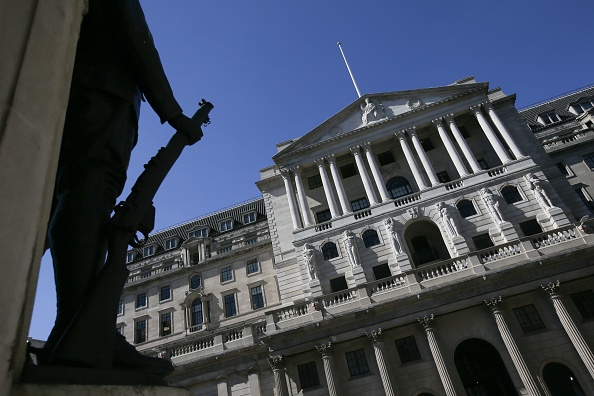The only way is down for UK interest rates, say City economists

The UK economy is in contraction mode, but the Bank of England isn’t greatly worried. GDP fell by 0.2 per cent by the second quarter of the year as Brexit uncertainty and a global slowdown held growth back.
Read more: UK economy shrinks for first time in seven years
Policymakers at the BoE are reluctant to fiddle with interest rates as the Brexit date of 31 October looms. New Prime Minister Boris Johnson has made it abundantly clear that Britain could be crashing out of European Union without a deal.
Noises from the British economy last week will have comforted bosses at the Bank and cemented their “wait and see” position. Inflation was shown to have picked up to 2.1 per cent, wages grew at their fastest pace in 11 years, and July retail sales delivered a pleasant surprise.
It looks, then, like only the shock of a no-deal Brexit would cause Threadneedle Street to tamper with rates, which currently sit at 0.75 per cent. Yet the BoE has repeatedly said that in such an event rates could move “in either direction”.
City economists are not convinced by this argument from Mark Carney and co, however. Peter Dixon, economist at Commerzbank, says: “There would appear to be no good arguments in favour of a hike”.
The Bank’s logic is that a tumbling pound could push up the cost of imports and drive up prices. But Dixon says the effects would only be felt “over a six to 12 month horizon”.
Eventually, he says, the BoE will have “to weigh up” the risks to inflation versus the risks to growth. “But that will not be a calculation they have to make anytime soon”.
Oliver Blackbourn, portfolio manager on the multi-asset team at Janus Henderson, concurs. “In the higher-inflation, lower-growth environment expected,” he says, “the Bank of England will choose to primarily worry about the latter”.
Read more: UK train fares set for another substantial rise as inflation climbs
He says lower availability of goods, services and workers for industry as well as consumers worrying about their incomes will weigh on economic growth. “This is likely to be the Bank’s main focus in its decision making.”
Turning the taps back on
Institute of Directors chief economist Tej Parikh says: “The precise shape of a no-deal Brexit and the scale of the government contingencies will play into the Bank’s final decision.”
Sajiv Vaid portfolio manager at Fidelity International takes a similar view, saying that in the event of a no deal, “the lesson to learn is that you cannot rule anything out”.
The shock could be so severe that policymakers might turn to the bazooka of stimulus bond-buying, or quantitative easing (QE), rather than the pistol of interest rate cuts. In even the relatively benign scenario modelled by the International Monetary Fund (IMF), Britain would enter a recession in 2020 and unemployment would rise by 1.5 percentage points.
Dixon says: “The BoE can always resume asset purchases. After all, the BoE balance sheet is only around 28 per cent of GDP – a full 10 percentage points lower than [European Central Bank] levels”
Government help
Craig Erlam, senior market analyst at foreign exchange firm Oanda, says a no-deal Brexit would force “at least one rate cut and perhaps additional quantitative easing”. He says the Bank will be hoping that “unlike in the aftermath of the crisis, the government also plays a role in providing an economic buffer”.
Vaid agrees. “I think this time will be different and expect fiscal policy to play its part,” he says. Blackbourn also says he thinks rates would be lowered, “likely alongside a large fiscal easing from the government”.
Read more: UK wage growth hits 11-year high despite shrinking economy
Almost all economists disbelieve the Bank when it says interest rates could move either way if a no-deal Brexit comes around. Blackbourn says: “Despite the inflation-targeting mandate, the Bank’s first reaction will be to support growth and later worry about inflation.”